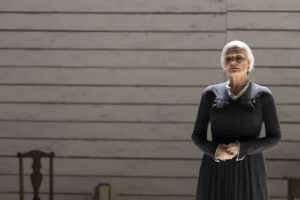
What does it mean anyway to get to know a diva, and why exactly would we wish to do such a thing? We wait outside stage doors, have ourselves photographed with them, and in rare instances, become their friends, but why them? We haven’t chosen to know them as we know our friends, with the idea we have things in common. We’ve chosen them.
And here I am, plunging headlong into presumptuous first-person plural.
These are, though, the questions that hit me square in the brain as I was reading Call Me Debbie, Deborah Voigt’s frank, sometimes funny, sometimes moving memoir. The first part of biographies and memoirs, the David Copperfield crap if you will, is always a struggle for me, because, as I started to say, the offstage lives of performers are in a certain way irrelevant to my interest in them; sometimes pointedly so—it can be easier to maintain positive feelings without the knowledge that someone is, say, buddy-buddy with the likes of Vladimir Putin. And when you come down to it, my only real experience of these folks is an experience of the singer, not the person. (But singers are people, you might argue, if you’ve never met one.)
With this lengthy caveat out of the way, I suspect anyone who doesn’t have a chip on his shoulder about Deborah Voigt will enjoy Call Me Debbie, and also be puzzled by parts of it. A lot of the affable, easy-going persona that has made her a good HD host comes through in the prose, but while this alone would make for a bland read, it’s coupled with an earnest insistence on telling the whole story.
There’s not a lot by way of industry gossip here—two blind items that Voigt, the first opera singer to really establish an internet presence, surely knows you can google up the answers to in a minute. Turning the lens on herself, however, Voigt rightly assumes that if you’re reading the book, you’re probably interested to hear the good, the bad, and the ugly. While it’s hard not to come away with the impression that she’s a little rose-tinted about the path of her career in recent years, she is gratifyingly open about the trials and tribulations that lay behind what we may have observed as periods of decline.
Early chapters focus on Voigt’s childhood, of course, but also, in a way that ended up being interesting to this lifelong atheist reader, on her faith. It is another reminder that the people we see on the stage and celebrate or deride may be less straightforward than we imagine them. I’ll confess I was alienated by the revelation in the first few pages that Voigt was told in so many words by the Guy Upstairs that she should spend her life singing, but over the course of the book it became clear that her spiritual life is expansive and affirming and allows her to use profanity. In part, we read a memoir to like our diva more, don’t we?
What probably counts as the selling point here, though, is the scandalous stuff. We know that some of our idols (Tibbett, Steber) struggled with alcoholism, but it’s another matter to hear about it first-hand, in unsparing detail. There are moments when Voigt’s chapters seem like epic shares at a meeting, and indeed it’s possible to wonder whether the writing of the memoir wasn’t in some sense a therapeutic project, but it’s no less involving for all that. And as ballsy as it may be to tell the world how much vodka you downed, Voigt’s straight talk about her love life may alienate or endear even more readers (depending on their own moral disposition.)
It will go without saying that weight and appearance come up a lot, but not in a score-settling way. The story of the little black dress has passed now into operatic lore, and at some point it became impossible to talk about Voigt without mentioning the damned thing, but it is nonetheless refreshing to hear her own take on it. On this subject, as on many more harrowing ones, she reveals what makes her relatable to many: not that she’s down to earth, but that she’s a good sport, which is a finer and rarer thing.
I’ll do a little confessing of my own, at this point: Voigt occasioned my first trip to the Met, and has been a favorite through some truly great performances and some that were better forgotten. I have followed her career with interest and fondness, probably heard her in all her major roles. I don’t know that I read this without bias. What I can say is that, by writing in her authentic voice, Voigt does, through the familiar-enough story of the rise of a talented singer enriched with candor and lived detail, let us know her better.
























Comments